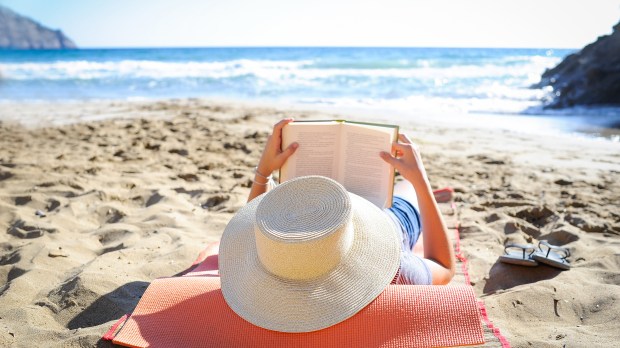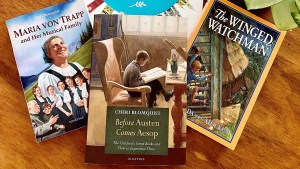Zoe Romanowsky
Two books to suggest — one I just finished and the other I am about to read, both for an online book club.
River of the Gods by Candace Millard is a new narrative non-fiction about two famous English explorers obsessed with finding the source of the Nile in the mid 1800s (Richard Burton and John Hanning Speke) as well as a man who’s been left out of the history books, African guide Sidi Mubarak Bombay. Millard doesn’t just present the historical data of their incredible adventures, but she also explores the psychological complexities of the characters and their relationships with one another, bringing the story alive.
The Anthropocene Reviewed: Essays on a Human Centered Planet by John Greene became an instant best-seller when it was published in 2021. The book started out as a podcast, where Greene tried “to chart some of the contradictions of human life as I experience it —how we can be so compassionate and so cruel, so persistent and so quick to despair. Above all, I wanted to understand the contradiction of human power: We are at once far too powerful and not nearly powerful enough.” I have not started it so I’m not sure what my review will be but apparently each chapter is a brief essay, and the style is engaging, so it’s a good one for summer reading.
Zelda Caldwell
This summer I’m on a French village kick. It started with a French TV series called “Un village Français,” set in the fictional town of Villeneuve in German-occupied France during WWII. It’s a bit heavy on the drama (soap opera-ish, really). I don’t mind that, but at seven seasons-long, it’s also a pretty big investment of time. To make it worth it, I decided to learn more about what life must have been like in small towns in France when the Nazis took over, and what motivated those resisters and collaborators.
A fortuitous trip to a neighborhood used book store left me with two treasures. I’m starting my summer reading with Village of Secrets: Defying the Nazis in Vichy France, by Caroline Moorhead, the history of a French village that helped rescue thousands of Jews.
Up next is Village in the Vaucluse, a wryly written sociological study of a post-World War II rural village in the south of France, based on the observations of the American scholar Laurence Wylie who moved there with his young family in 1950.
Opening a page at random, I come across this observation, which in no way dissuades me from my plan to read it: “Only two big families are respected, and they are referred to as ‘beautiful families.’ The Jouves are a young couple from the city, devout Catholics who have ‘returned to the soil’ because of idealism. They hope to bring religion back to the religiously indifferent rural areas of France. Few people of Peyrane share the ideals of the Jouves but they respect them because of their social rank and admire their family of four little children.”
Matthew Green
I plan on reading An Immense World, by Ed Yong, in which the science writer, following the ideas of German biologist Jakob von Uexküll, guides the reader through an exploration of the unique sensory world, or Umwelt, of various animals. I chose this in part because it’s simply fascinating, but also because it ties in with a course on anthropobiology I took while studying for my master’s degree in philosophy. It touches on the openness of the human, and the analogy of the indetermination of the human spirit with the biological indetermination of the human being. It’s been a long time since I thought about this topic, but the book sounds very interesting.
Phil Kosloski
This summer I’ve started J.R.R. Tolkien’s Lord of the Rings again. This time I’m doing so to prepare for Amazon’s Ring of Power series that will be debuting in September.
Tess Barber
I don’t know which book to pick. I just finished The Cartographers, a fast-paced modern mystery. Currently working my way through Kristin Lavransdatter (rereading for the third time; I think it is the greatest novel ever written, in any language) and two non-fiction books, Unconditional Parenting and Move Your DNA.
J.P. Mauro
I recently began reading Did Ye Hear Mammy Died?, a memoir from author Séamas O’Reilly. It recalls the death of his mother. Séamas, who was just five years old at the time, had only a vague notion of what death meant and winds up wandering around the wake cheerfully asking family friends “Did ye hear Mammy died?”
While the scenario seems macabre, O’Reilly’s writing style is full of Irish humor and reflective anecdotes. The memoir focuses on the innocent perspective of a young boy and the way he comes to grasp the death of his mother. Séamas was too young to fully remember the wake, but instead he treats the reader to vivid recollections of the way his new corduroy pants felt to his little hands, the unending stream of inedible fruitcakes brought by mourners, and how dark his room was on the morning of his mother’s death, as his father had not been home to draw the curtains.
Growing up in a devout Catholic family, as eleven children with only their father to guide them, Séamas and his siblings live through turbulent times at the tail end of the Northern Ireland Conflict, also known as The Troubles. Séamas’ story, however, eschews the political turmoil to describe life in a large Catholic family as they continue to grow after the loss of a parent.
There are moments that draw raucous laughter from the reader, as well as tear-inducing sections that are deeply touching. This book is a must read for any fan of Catholic literature and a worthy addition to anyone’s summer reading list.
Cerith Gardiner
I have a pile of books that I’ve been dying to read for months; so now is the time!
I’m actually going to read Stephen King On Writing in a bid to help my own writing skills. Described as “part memoir, part masterclass,” I’m sure it will give me a little insight into the craft of writing, as well as the prolific author himself.
I’m also going to read a book called Shuggie Bain by Douglas Stuart. It was a winner of the Booker Prize in 2020 (that’s how long it’s been on my shelf) and it speaks of a child’s love for his alcoholic mother. It takes place in some run-down tenements in Glasgow, and I’ve heard it’s hard-hitting, but extremely beautiful.
Finally, I’m going to flick through a recent favorite, Finding Frassati by Christine M. Wohar. It’s one of those books I turn to for a little inspiration now and then. It’s about my all-time favorite saint (I know, they’re all great, but this chap really speaks to me!) Bl. Pier Giorgio Frassati. He’s just one of those inspiring people who are more relatable than others. The book is highly readable and very user-friendly. You can dip in and out and get some great ideas to just be a better person. It’s one of those books that will always be on my bedside table; probably on top of all the other books on my reading list!
John Burger:
Homer’s Odyssey. I’ve always wanted to try to read everything on the Thomas Aquinas College List of Great Books, and this is the second item on the list. I’ve got a long way to go.



